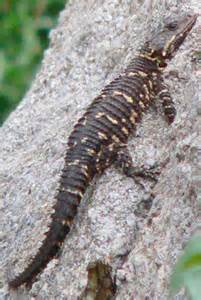Type the name of the breed you're looking for below
[wpdreams_ajaxsearchlite] Don't see the breed your're looking for? Click here and let us know!
Warren’s Girdled Lizard
| Place of Origin and Range | Warren’s girdled lizard is a relatively large, flattened lizard from the Lebombo Mountains in northeastern South Africa and eastern Swaziland. |
| Description | The species has a snout to vent length of 105-130 mm. The back is dark brown with small yellow spots forming bands. The belly is light brown and the throat and lips are mottled. Males have 10-12 femoral pores. The tail is spiny and slightly longer than the body length. |
| Morph Patterns Available | Yes |
| Adult Size | Can grow up to 12 in (30 cm) |
| Accommodation | They spend most of their waking hours basking in the sun, hiding in underground chambers at daytime or when danger appears. They tend to establish themselves in hilly, rocky areas with good shelter and accessible vegetation. These lizards tend to bask in areas with surface temperatures of over 50 °C (120 °F). A dedicated room with lots of rocks and substrate is the best idea. No water dish, Just plenty of leafy greens. |
| Lifespan | Can live up to 20 years |
| Feeding / Diet | Eats a variety of insects. |



